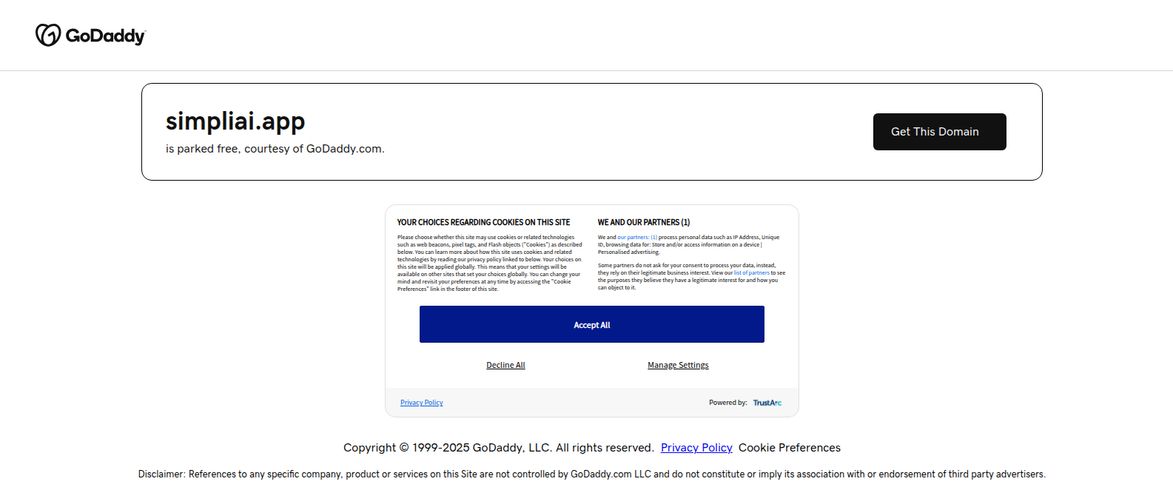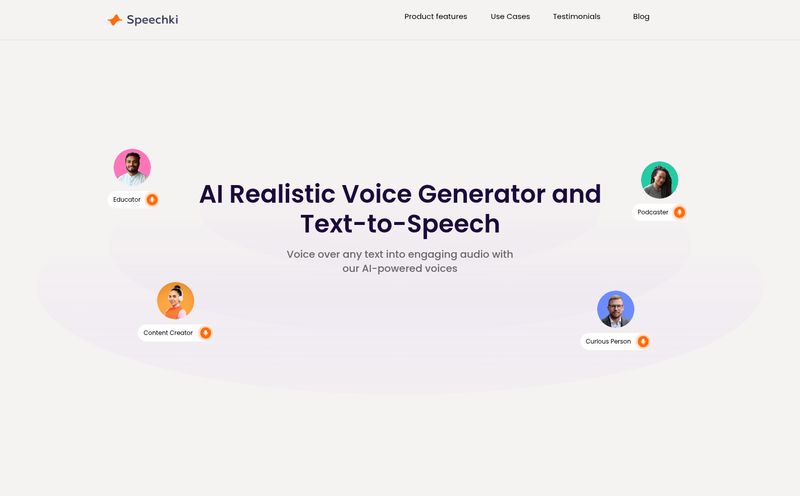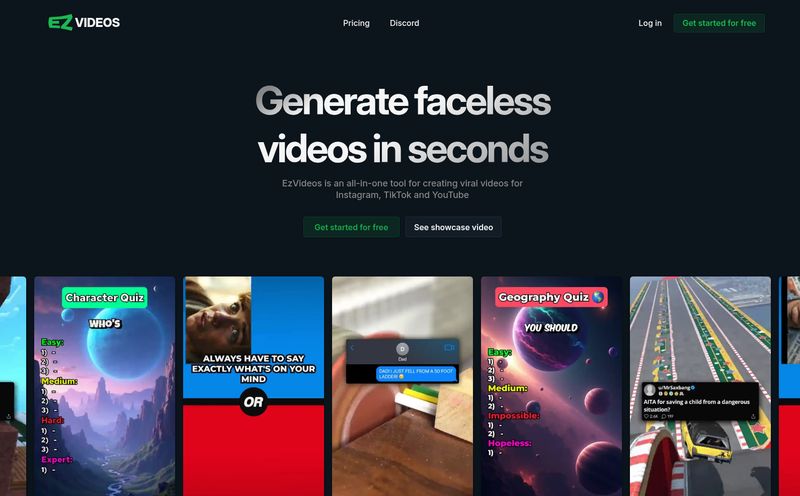We've all been there. You have this fantastic idea for an ebook. It could be the ultimate lead magnet for your business, a passion project you've been dreaming of, or just a great way to repurpose all that blog content you’ve painstakingly written over the years. The idea is golden. The motivation is there. But the writing... oh, the writing. Staring at that blinking cursor on a blank page can feel like trying to push a boulder uphill.
I've spent years in the content trenches, and I can tell you, the single biggest hurdle for most people isn't a lack of ideas—it's the sheer time and effort it takes to get them down on paper. So, when a tool like EbookMaker pops up on my radar, claiming to “turn any idea into an e-book instantly,” my professional curiosity gets the best of me. Is it just another overhyped AI gimmick, or is it a genuinely useful tool for creators?
I decided to take a look under the hood. And what I found was... interesting.

Visit Ebookmaker
So, What is EbookMaker, Really?
At its core, EbookMaker is an AI-powered platform designed to do one thing exceptionally well: generate a complete ebook from a single title. You don't feed it an outline, you don't give it bullet points. You give it a title. That’s it. It’s like having an AI ghostwriter on standby, ready to spin up a first draft at a moment's notice.
The platform boasts that it has already been used to create over 250,000 e-books, which is a pretty staggering number. It tells me there's a real demand for this kind of rapid content creation. The entire premise is built on simplicity and speed, aiming to remove that initial friction point of creation.
The Ebook Creation Process Broken Down
Their homepage lays out a slick 3-step process. Well, sort of. In a quirky bit of web design, they list the steps as 2, 1, 3. I'm not sure if it's a typo or a clever way to get my attention, but either way, here’s how it actually works:
- Choose your e-book type: You start by selecting the kind of book you want to create. This likely helps the AI set the right tone and structure.
- Enter your title: This is the magic input. Your grand idea, distilled into a single, compelling title.
- Let the AI work: You click the button and the AI, as they put it, “does the work” for you.
From there, the platform generates the content, chapter by chapter. You can even specify how many chapters you want, giving you a bit more control over the book's length and depth. It’s a fascinatingly simple front-end for what is surely a complex process happening in the background.
Beyond the First Draft: Customization and Features
Okay, so getting an instant first draft is cool. But let's be honest, no AI-generated text is ever perfect right out of the box. Any creator worth their salt knows the real magic happens in the edit. This is where EbookMaker surprised me a little.
Tailoring Your Digital Clay
Once the AI has done its thing, you're not just stuck with the output. The platform provides a suite of editing tools. You can go in and tweak the text, rewrite sentences, and inject your own voice and expertise. It's like the AI builds the skeleton, and you get to add the muscle and personality. You can also customize the look and feel—adjusting fonts, colors, and adding your own images to make the ebook truly yours. This is a critical step to avoid your content looking like, well, a robot wrote it.
From Text to Voice with the Audiobook Feature
Now this is a feature that genuinely got me excited. EbookMaker can take your finished text and convert it into an audiobook. You can even choose from different voices. In an age where people consume content on the go—during commutes, at the gym, while doing chores—having an audio version of your ebook is a massive value-add. This isn't just a gimmick; it's a smart way to increase the accessibility and reach of your content. For marketers creating lead magnets, imagine offering both an ebook and an audiobook. That’s a powerful incentive.
Multiple Formats for Every Reader
What good is an ebook if your audience can't read it on their device of choice? EbookMaker understands this and offers several export options: standard PDF, a reflowable ePub for e-readers like Kindle and Kobo, and even an interactive FlipBook format. This versatility means you can distribute your work across almost any platform, from a direct download on your website to listing it on Amazon.
The Big Question: Who Owns the Copyright?
This is the million-dollar question for any creator using AI. If an AI writes it, who owns it? I was relieved to see EbookMaker address this head-on in their FAQ section. The answer is clear: the copyrights belong to you, the user. This is non-negotiable for any serious author or business. You're simply using a tool to create the content; the final product and all the rights associated with it are yours. Phew.
Let's Talk Money: The EbookMaker Pricing Model
Alright, here’s where things get a bit murky. When I went to find concrete pricing details, the “Plans” link in the header led me to a 404 error page. A classic “Ops... essa página não existe” message, which tells me the site might have some international roots (or just a broken link). Not the best look, I have to admit.
However, by digging through the FAQ, I was able to piece together the model. EbookMaker appears to operate on a credit-based system. You don't pay a flat monthly fee for unlimited books. Instead, creating an e-book costs a certain number of credits, and the cost seems to depend on the number of chapters you generate. Furthermore, it seems the editing features are only unlocked after you've purchased credits. This is a bit of a downside for me; I'd prefer to be able to edit a watermarked or limited version before committing money. It’s a “pay-to-play” model, which can be great for occasional users but might get pricey for prolific creators.
The Good, The Bad, and The AI-Generated
So, after all that, what’s my verdict? Like any tool, it has its brilliant moments and its potential pitfalls.
On the one hand, the sheer simplicity is its greatest strength. The ability to go from just a title to a multi-chapter ebook draft in minutes is a game-changer for overcoming writer's block. The audiobook generation is a standout feature that adds real, tangible value, and the fact that you own the copyright is a huge relief. It’s an incredible content creation launchpad.
On the other hand, the credit-based system with editing locked behind a paywall feels a bit restrictive. I've always been a fan of transparent, upfront pricing. The cost could also add up quickly if you’re creating long, multi-chapter books. And, of course, there's the inherent risk with any AI writer: if you don’t put in the work to edit and personalize the content, you risk publishing something that is generic and lacks a human touch. It's a tool, not a magic wand.
Who is This Tool Actually For?
I don't think EbookMaker is for the novelist looking to write the next great American epic. But that's not its goal. I see it being incredibly useful for:
- Marketers and Small Businesses: Need to pump out high-quality lead magnets fast? This is your tool. Think guides, whitepapers, and short informational ebooks.
- Bloggers and Content Creators: A fantastic way to repurpose existing blog post ideas into a more substantial format to grow your email list.
- Aspiring Authors: A great way to quickly flesh out an idea and see if it has legs before you invest hundreds of hours writing it from scratch.
- Coaches and Consultants: Quickly create materials for your clients or short books to establish your authority in a niche.
Frequently Asked Questions about EbookMaker
- Is the content generated by EbookMaker plagiarism-free?
- While most advanced AI models are designed to generate original content, it's always a best practice to run the final text through a plagiarism checker like Copyscape, especially if you're publishing commercially. Consider the AI's output a unique draft, but always verify.
- Can I really create an ebook with just a title?
- Yes, that is the core premise of the platform. The more specific and well-defined your title is, the better and more relevant the generated content will likely be.
- How does the credit system work?
- Based on the site's FAQ, you purchase credits, and then spend those credits to generate ebooks. The cost in credits for an ebook seems to be tied to the number of chapters you choose to generate. Editing features are unlocked after purchase.
- Do I own the rights to the books I create?
- Yes. EbookMaker explicitly states that the full copyrights for the ebooks and audiobooks you create belong to you.
- Can I sell the ebooks I make on Amazon?
- Absolutely. Since you own the copyright and can export in formats like ePub, you are free to publish your work on platforms like Amazon KDP. The site even has a link in its footer about selling on Amazon.
- Is the audiobook voice natural-sounding?
- Modern text-to-speech AI has improved dramatically. While it might not have the nuance of a professional human voice actor, the quality is often very high and more than suitable for many applications, especially for informational content or lead magnets.
Final Thoughts
EbookMaker is a powerful and intriguing tool. It's not going to write a bestseller for you while you sleep, but it can shatter writer's block and slash the time it takes to get a project off the ground. It’s a specialized tool that knows exactly what it wants to be: the fastest way to get from idea to a finished ebook and audiobook.
If you're a creator or marketer who values speed and needs a reliable way to produce content drafts and lead magnets, I think it’s absolutely worth a look. Just be prepared to roll up your sleeves and put your own personal stamp on the final product. After all, the best tools don't replace the artist; they just give them a better paintbrush.



